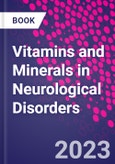Table of Contents
Preface
1. Vitamins and Minerals and in the context of reference values and requirements
Rajkumar Rajendram
I. Alzheimer's Disease and Dementias
2. Alpha-tocopherol for Alzheimer's disease
Amal Kaddoumi
3. Cognitive impairment and micronutrients: Vitamin B12, folate, and homocysteine and implications for dementia
Gianluca Rizzo and Angela Marino
4. Magnesium and Alzheimer's disease
D�nahin Hinnoutondji Toffa and Jimmy Li
5. Copper, Oxidative Stress, Alzheimer's disease and Dementia
Rosanna Squitti, Mauro Rongioletti and Gianfranco Liguri
6. Chromium and Alzheimer's disease
Sangeeta Pilkhwal Sah and Ansab Akhtar
II. Amyotrophic Lateral Sclerosis
7. Riboflavin and lower motor neuron diseases
Y. Nadjar
III. Brain Injury
8. Vitamin C (L-Ascorbic Acid) in Brain Injury
Stefan W. Leichtle, Sulaiman Al Mohaish, Melissa Sandler, Vishal Yajnik, Dennis Rivet, Markos Kashiouris, Alpha Fowler and Gretchen M. Brophy
9. Antioxidant vitamins in brain injury with or without antibiotics
Anoop Kumar I
10. Vitamin D and traumatic brain Injury
Ajay Choudhary
11. Zinc and traumatic brain injury: implications for dietary modulation
Paul A. Adlard
IV. Cerebral Palsy
12. Cerebral palsy: Evaluating vitamin D levels
M. A. Bellomo-Branda
V. Dietary Neurotoxins
13. Linking copper and neurotoxic activities
Gesivaldo Santos
VI. Epilepsy
14. Epilepsy-derived neurodegeneration and vitamin E
Francesco Galli
15. Selenium use in epilepsy
Haitham S. Mohammed
16. Reduced Vitamin C and minerals in epilepsy
Mohammad Safiqul Islam
17. Thiamine, transporters and epilepsy
Sunita Bijarnia-Mahay, Arushi Gahlot Saini and Harjit Singh Mahay
VII. Headaches and Migraines
18. Riboflavin usage in pediatric migraine
Gaku Yamanaka
19. Vitamin B12, folate and migraine
Ioannis Liampas, Vasileios Siokas, Christos Bakirtzis and Efthimios Dardiotis
20. Vitamin D and migraine
Parisa Gazerani
VIII. Multiple Sclerosis
21. Iron, zinc and multiple sclerosis patients
Jamilah Borjac and Alaa Matar
22. Vitamin D3 supplementation and multiple sclerosis
Joost Smolders and Jan Damoiseaux
IX. Neuroinflammation
23. Magnesium reducing neuroinflammation
Renu Agarwal and Igor Iezhitsa
24. Vitamin B12 as a neuroprotectant in neuroinflammation
Roney S. Coimbra, Larissa Cassiano and Marina Oliveira
25. Vitamin D (VD3) effects on neuroinflammation and neurodegenerative disorders: focus on Alzheimer's and Parkinson's diseases
Glauce.Socorro de Barros Viana
26. Vitamin c and neuroinflammation
Amanda Marino, David Consoli and Fiona E. Harrison
27. Vitamin A and all trans retinoic acid ( ATRA) on neuroinflammatory changes in the brain
Saritha Nair, S. Priyanka and Indira M
28. Fluoride Excess and Neuroinflammation
Varun Kumar Sharma, Charu Tyagi, Dudha Namrata, Yugandhar Reddy and Lomas Kumar Tomar
X. Parkinson's Disease
29. Vitamin D and Parkinson's disease
Valeria Gon�alves, F�lvio Scorza, A.C. G. Almeida and Carla A. Scorza
30. Tocotrienols and Parkinson's disease: modelling in vivo and vitro
Tatsuya Matsura
31. B vitamins, pyridoxal phosphate and Parkinsonism
Adejoke Y. Onaolapo and Olakunle James Onaolapo
32. Antioxidant vitamins in Parkinson's disease: Vitamins A, C and E
Woon-Puay Koh and Ariel Fangting Ying
33. Calcium- and Parkinson's disease
Payam Saadat and Kiarash Saleki
34. Micronutrient levels in Parkinson's Disease
H. Afridi Sr.
35. Genes and dietary metals in Parkinson disease
Shiek SS.J Ahmed, Jency Roshni, Mahema S. and Janakiraman V
XI. Peripheral Neuropathy
36. Vitamin D levels and diabetic peripheral neuropathy
Rizaldy Pinzon, Angela Angela, Vanessa Veronica, Febrina Eva Susanto and Andryawan Pradana
37. B Vitamins in the nervous system: a focus on peripheral neuropathy
Ana Mar�a P�ez-Hurtado, Maria Camila Cortes-Albornoz, Diego Alejandro Rodr�guez-Gomez, Carlos Calder�n-Ospina and Mauricio O. Nava-Mesa
XII. Prenatal Effects and Neurodevelopment
38. B-vitamins, deficiencies and maternal over supplementation on neurodevelopment: an updated narrative
McCoy Clementson, Jesse Jauhal and Nafisa M. Jadavji
39. Trace elements in neurodevelopment: an updated narrative
Anatoly Skalny, Lyubov Chernova and Anastasia Skalnaya
40. Gestational Folic Acid in Neuronal Development of the Hypothalamus
G. H. Anderson
XIII. Stroke
41. Vitamin B12, hyperhomocysteinaemia and stroke
J. David Spence
42. Dietary sodium and stroke: A new narrative
Ahmad Jayedi and Sakineh Shab-bidar
43. Dietary calcium and stroke
Ka Kahe
44. Resources
Rajkumar Rajendram








